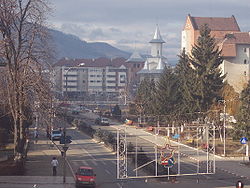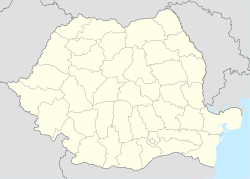Comănești
| Comănești | |
|---|---|
| Town | |
 |
|
| Location of Comănești | |
| Coordinates: 46°25′47″N 26°27′0″E / 46.42972°N 26.45000°ECoordinates: 46°25′47″N 26°27′0″E / 46.42972°N 26.45000°E | |
| Country |
|
| County | Bacău County |
| Status | Town |
| Government | |
| • Mayor | Viorel Miron (National Liberal Party) |
| Area | |
| • Total | 63.86 km2 (24.66 sq mi) |
| Population (2011) | |
| • Total | 19,568 |
| Time zone | EET (UTC+2) |
| • Summer (DST) | EEST (UTC+3) |
| Website | http://www.comanesti.ro/ |
Comănești (Romanian pronunciation: [koməˈneʃtʲ]) is a town in Bacău County, Romania, with a population of 19,568. It is situated on the Trotuș River, which flows between the Ciuc and the Tarcău mountains (10 km (6 mi) of its course pass through Comănești).
The town administers two villages, Podei and Vermești.
The area of the town of Comănești has been inhabited since the Neolithic period - Neolithic remains were found in the Vermești area of the town. The name is derived from the Cumans who once ruled the region. Its first written record dates from 1657, and its first presence on a map from the 1696 Sanson Map.
From the late 18th century onwards, the town was in the domain of the Ghica family of boyars, who remained an important presence in the area until the middle of the 20th century. The Ghica Palace (now housing the local museum), the park in front of the museum, and the railway stations are testimonies to their presence in the town.
During the summers of 2004, 2005, and 2006, Comănești suffered severe flooding of the Trotuș.
The 2011 census counted 19,568 inhabitants.
As of 2003, it had an unemployment rate of 18.1%, much higher than the country's average, and the town was declared an underdeveloped region.
The town is in the centre of a large coal field and there are also smaller amounts of oil in the area. The coal mine, which in 1989 employed 5,000 people, was finally closed down in 2005, leaving the last group of miners (260 in all) unemployed. The other major industry of the town is forestry, but the large lumberyard and factory were also closed; this area of enterprise is now dominated by small businesses.
There have been new initiatives in recent months to attract investment into the area in both the industrial and tourism sectors.
...
Wikipedia

